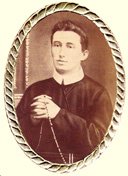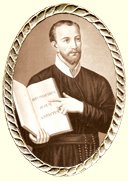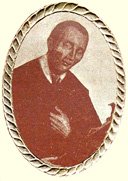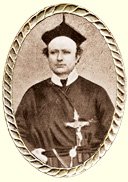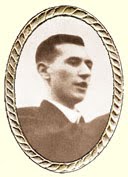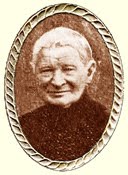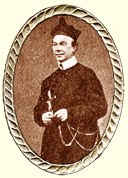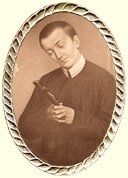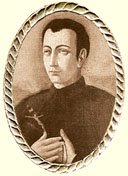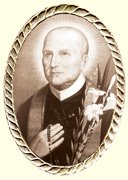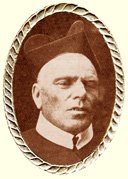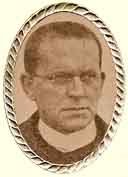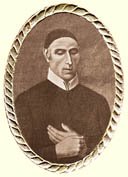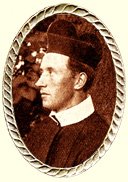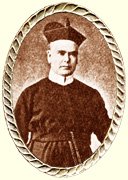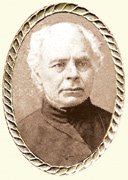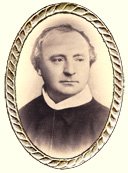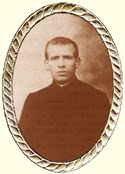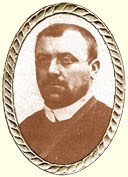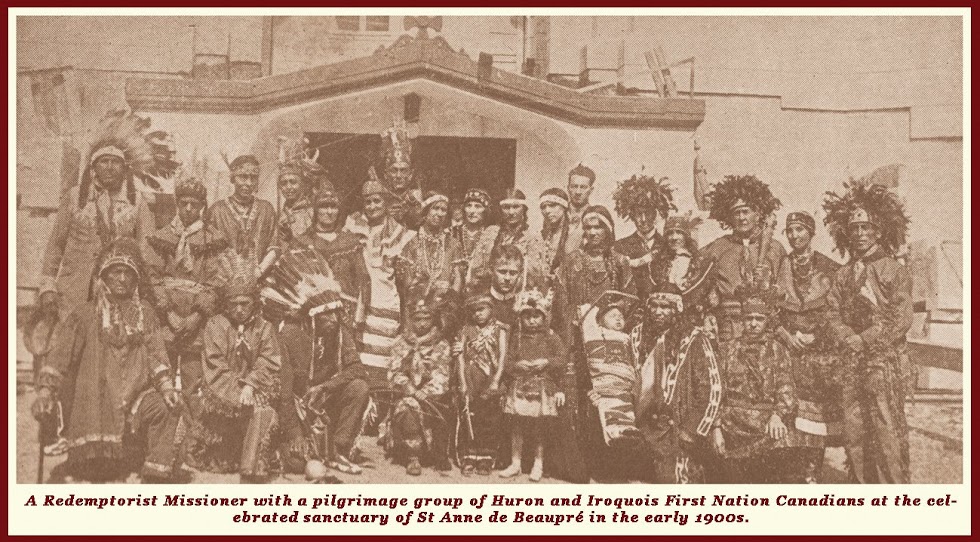Br Sebastian Engel, C.SS.R. (1859-1929)
 In one of Europe’s most beautiful regions, where the Rhine is forced foaming through the steep mountain sides, there lies the village of Kestert, with its 800 inhabitants. It is located on a small plain, roughly seven kilometres from St Goarshausen, between the raging mighty river and the mountainside vineyards. In this village of Kestert, on the 20th January 1859, a son was born to Johann Engel and his wife Regina. He was baptised Jacob Sebastian Engel and was the eldest of seven children. His mother was to die young, and his father, who was in poor health, remarried.
In one of Europe’s most beautiful regions, where the Rhine is forced foaming through the steep mountain sides, there lies the village of Kestert, with its 800 inhabitants. It is located on a small plain, roughly seven kilometres from St Goarshausen, between the raging mighty river and the mountainside vineyards. In this village of Kestert, on the 20th January 1859, a son was born to Johann Engel and his wife Regina. He was baptised Jacob Sebastian Engel and was the eldest of seven children. His mother was to die young, and his father, who was in poor health, remarried.Young Jacob's great love for his father gave him strength and courage; and he was his father’s pride and joy. He worked for his keep in the fields and vineyards. His efforts were always tireless and conscientious, willing and obedient - no one ever needed to ask Jacob twice. It was his habit to rise secretly between two and three in the morning to go and work for his father, in order to lessen the burden on him. On one occasion he bumped into an acquaintance. “So, Jacob, and who woke you so early?” The young man merely remarked with an astonished expression, “Who needs to be awoken?”
The consensus of opinion amongst his contemporaries was that Jacob was always exemplary and friendly in everything he did. He maintained a cheerful, even amusing disposition, in spite of the fact that he found little of interest in the secular world. The early death of his mother, the illness of his father, and an accident which befell his brother that resulted in serious injury, had caused him to understand that this life could be a serious and difficult business. He once said in his inimitable way that it “almost annoyed him that he could not enjoy music and dance as much as his friends.”
It was no wonder then that the local priest was moved to give the unworldly fourteen-year-old lessons which he hoped would lay the foundations of a future priestly vocation. However, Jacob knew he would have to be patient; for he would have to wait until he had reached the age of twenty-seven, so that his younger sister could complete her education. By then, however, it was decided that it was too late for him to study for the priesthood.
Yet he did not slacken his prayers to be allowed the grace of a religious vocation, so as to leave the world. When he revealed to his father that he wanted to enter a monastery, the good man promptly agreed, but the question remained of which one he ought to enter. The only religious with whom Jacob was acquainted were two brothers of the Brothers of Mercy, who were at that time helping the Rector of the church at Bornhofen-am-Rheine (which the Redemptorists themselves had inhabited between 1850 and 1873.) This pilgrimage church was just forty-five minutes away from Kestert, and Jacob had himself been a volunteer worker in its garden, so it seemed to him natural to seek help there in his quest to become a religious.
As it happened, about this time Brother Xavier, a Redemptorist from the Lower German province, visited Kestert. Jacob’s father thought that it would surely be better for Jacob’s soul to apply to the Redemptorists, as their order also contained priests. When Br Xavier was approached, he was noncommittal in his response; but he did promise that he would take the matter to his provincial. The eventual reply from Reverend Provincial Fr Sposz was discouraging. It said there were enough brothers in the lower province, but if it would be acceptable to Jacob, he could perhaps apply for admission to another province of the Congregation. Jacob replied in his succinct way, that it was all the same to him where he found himself; he just wanted to escape this world. Eight days later came a reply from Dongen in Holland, where, because of being banned from their homelands, the French-Swiss seminary was located. It was from Fr Mathias Raus, later to be Rector Major of the order, and Jacob was invited to present himself at the seminary, and was requested to advise the date of his arrival.
The postulant now undertook the first long journey of his life. He passed through Cologne and Venloo, and in the evening reached Breda in Holland. He was greatly perturbed because he spoke only German, yet heavenly providence was at hand, and caused him to meet a local who spoke German. This kindly man not only advised him, but ensured that Jacob had accommodation for the night. The next morning he also took him to the station and made sure he was on the right train.
For the first time in his life, Jacob had spent a night away from home. His appearance must have been such that he could only be a religious or a religious postulant, as people, even though complete strangers, were inclined to be solicitous towards him. When his train reached a station with a name which included Dongen, he made as if to alight. However a stolid Hollander took out his watch and using gestures informed Jacob that his destination would not be reached for half an hour.
When Jacob eventually arrived at the monastery door, he was met by the houseke
 eper who directed him into the reception room, where he was soon greeted by the good Fr Raus. Jacob proffered his documents; but they were politely declined by Fr Raus, who was convinced that all the papers in the world would not be needed to endorse the young man who stood before him, his appearance and demeanour being quite sufficient.
eper who directed him into the reception room, where he was soon greeted by the good Fr Raus. Jacob proffered his documents; but they were politely declined by Fr Raus, who was convinced that all the papers in the world would not be needed to endorse the young man who stood before him, his appearance and demeanour being quite sufficient.Jacob remained in Dongen for twenty-two months, being first put to work in the garden, and then after four weeks in the kitchen. He was also being instructed in French by Frs Bohn and Wilz. He found the atmosphere in Holland much to his liking, and now it was time to take the first step towards his vows.
On the 15th October 1889, Br Sebastian (as he was now named) began his Noviciate, and on the 9th November he was clothed. Fr Gaget was his novice master. Br Sebastian was instructed in the religious life by the conferences held from time to time for the novices by the holy blind Father, Fr Victor Humarque, C.SS.R. On 26th April 1890, on the feast of our Lady of Good Council, Br Sebastian’s first vows were made, and he then returned to Dongen. In October 1893 he was sent from the seminary to Uvrier in Switzerland, and finally he found himself in Antony near Paris in June, 1895, for his second noviciate He began to prepare for his final vows under the guidance of Fr Lemette, who was later replaced by Fr Riblier.
Meanwhile a joyful event took place. The Redemptorists, who had been banned from Germany during the "kulturkampf", were to be allowed back into Alsace-Lorraine. Br Sebastian was directed to the newly founded Vice Province (later Strasburg Province) and he came to Teterchen on 4th October. There on Christmas Day, before the altar of Our Blessed Mother, he made his final vows, vows to which he would adhere with total fidelity, and which would be his great joy into eternity.
The Redemptorist Brother
From the beginning Brother Sebastian took his vocation extremely seriously; he wanted to help in the salvation of souls through prayer, sacrifice and work. The kitchen was his domain. We still possess the book in which all kinds of recipes, notes, and reminders were industriously saved. His eagerness to be practical and efficient was obvious; he concerned himself with anything and everything to do with the kitchen, the cellar and the house. Beyond all this he endeavoured, whenever it was possible, to be useful elsewhere.

Yet soon he was to say farewell to Teterchen, and on the 30th October, 1900, Br Sebastian set out for Echternach in Luxemburg, arriving the next day. Echternach was the location of the Vice-Provincial Seminary which was undergoing refurbishment, and enlargement. For the next few years, Br Sebastian was to be kept busy not only in the kitchen, but also in various rebuilding projects. During this time he established himself not only as a reliable member of the community, but also as a beloved companion, especially to the students, who appreciated his short, laconic humour, and also his tireless enthusiasm, and helpfulness.
 It was 1912 when Br Sebastian learned that his help was required elsewhere. The 9th July found Br Sebastian en route to the well known pilgrimage Church of Drei Aehren in the Bogesen. The church was situated in the most beautiful setting, surrounded by perfumed pine forests. Unfortunately there were only two Fathers and two Brothers available, even in the height of summer, to care for the continuous stream of pilgrims. The kitchen and portery were Br Sebastian’s responsibilities, and so he had to deal with all the enquiries, petitions, and complaints of the pilgrims. Indeed on Sundays, Br Sebastian was frequently to be seen running back and forth to fulfil his duties as thurifer at High Mass, and also to function as porter. It was also usual for him to keep an eye on what was cooking in his pots and pans, whilst simultaneously acting as sacristan. The distance from the front door to the kitchen and the chapel was considerable, so all told his duties were frequently exacting and wearisome, yet all were performed tirelessly by the customarily affable, laconic Br Sebastian. Then came the war.
It was 1912 when Br Sebastian learned that his help was required elsewhere. The 9th July found Br Sebastian en route to the well known pilgrimage Church of Drei Aehren in the Bogesen. The church was situated in the most beautiful setting, surrounded by perfumed pine forests. Unfortunately there were only two Fathers and two Brothers available, even in the height of summer, to care for the continuous stream of pilgrims. The kitchen and portery were Br Sebastian’s responsibilities, and so he had to deal with all the enquiries, petitions, and complaints of the pilgrims. Indeed on Sundays, Br Sebastian was frequently to be seen running back and forth to fulfil his duties as thurifer at High Mass, and also to function as porter. It was also usual for him to keep an eye on what was cooking in his pots and pans, whilst simultaneously acting as sacristan. The distance from the front door to the kitchen and the chapel was considerable, so all told his duties were frequently exacting and wearisome, yet all were performed tirelessly by the customarily affable, laconic Br Sebastian. Then came the war.
For two long years, the community of Drei Aehren would endure terror just eight kilometres behind the front line. Br Sebastian kept a diary in which he graphically describes the sufferings and dangers undergone by the Redemptorist community and those in their care. We will relate some pages taken from the diary.
“Our quiet place of pilgrimage would soon resound to the wild sounds of fighting. On August 9th one could hear the thunder of cannon fire from Mullhouse; on the 10th the Bavarians turned back to Drei Aehren; a French advance on 20th August reached Colma r, and French troops held Drei Aehren until the 29th. The Bavarian counter attack came from their position in the mountains above our village, and on 1st September there was hand to hand fighting in the streets. Our house was commandeered by the Bavarians and Baden-Wuertemburgers.” Br Sebastian was no longer in control of the house. “Our workshop is completely under the control of the soldiers from morning to evening. They take the key, and keep it to themselves; the garden is also exclusively their domain, and as far as I’m concerned so are the plants and vegetables”. Alterations and additions were made, stables were erected. There were now, also, many wounded.
r, and French troops held Drei Aehren until the 29th. The Bavarian counter attack came from their position in the mountains above our village, and on 1st September there was hand to hand fighting in the streets. Our house was commandeered by the Bavarians and Baden-Wuertemburgers.” Br Sebastian was no longer in control of the house. “Our workshop is completely under the control of the soldiers from morning to evening. They take the key, and keep it to themselves; the garden is also exclusively their domain, and as far as I’m concerned so are the plants and vegetables”. Alterations and additions were made, stables were erected. There were now, also, many wounded.
However on 29th August things were to get much worse “for a day and night we came under heavy bombardment (the German troops, erroneously, were of the opinion Drei Aehren was still occupied by the French).The grenades were falling left and right but fortunately no buildings were hit, although many windows were broken from the blast. The first exploded over the monastery, and the splinters clattered over the roof while Br Michael and I were in the garden picking beans. We beat a hasty retreat, as did also the entire population of our village, to the monastery, where the walls are thicker. The villagers had assembled in our cellar, which resembled a beehive. We prayed the rosary, and the Protestants joined us.
There was much fighting in the house, which had been overwhelmed by those seeking shelter, as well as the troops. The whole turmoil was caused by the need to drive the French Troops from Drei Aehren; but there had been none there for some time. All this simply resulted in terrifying the locals. That nothing awful had happened here can only be attributed to Our Blessed Mother, because there was certainly the intention to kill us. Soon after this we were again fired upon, this time from the nearby Honack, but the battery there was destroyed by the Bavarians. About this time even more troops were billeted with the monastery, their number now reaching 300”.
 Br Sebastian was accustomed to peace and quiet and especially order which he greatly valued. He poured out his heart in his diary to describe his dismay at the circumstances in the house: “It is impossible to move, or do anything without one’s passport and papers being demanded. The house smells terrible ... the firewood keeps disappearing from the shed ... and there is constant rushing about, day and night, and slamming of doors. On 10th April 1915 the monastery was required to accommodate a 150 strong medical corps. After every attack at the front at Baerenstall and Lingekopf we bury the dead, now over 200, in our terrace. The wounded are also cared for here; these were soon to number 2000. Oh blessed monastic silence!”
Br Sebastian was accustomed to peace and quiet and especially order which he greatly valued. He poured out his heart in his diary to describe his dismay at the circumstances in the house: “It is impossible to move, or do anything without one’s passport and papers being demanded. The house smells terrible ... the firewood keeps disappearing from the shed ... and there is constant rushing about, day and night, and slamming of doors. On 10th April 1915 the monastery was required to accommodate a 150 strong medical corps. After every attack at the front at Baerenstall and Lingekopf we bury the dead, now over 200, in our terrace. The wounded are also cared for here; these were soon to number 2000. Oh blessed monastic silence!”
On June 22nd Br Sebastian wrote: “Not only in the house, but outside, one is always in the company of soldiers, and there is always trouble and fighting ...” On 21st July: “All the corridors are full of soldiers, as are the garden and barn”. “A thunder without end! Half the soldiers never return.”
On 30th July: “The whole house is full of murder and is permeated by the smells of death. We are regularly bombarded by the French artillery; there is intense fighting at the front, so intense it is impossible to count the shots, just a constant roar. And that applies to the streets of Drei Aehren too, because of the number of troops and munitions reinforcements that are here. The villagers are beginning to flee; several houses have been badly damaged. Our treasure of the pilgrimage, the miraculous image, was rescued on 6th August by our Provincial, Fr Herold, who escaped with it to Ammerschweier hidden in a pram.

In the same month our altars were damaged. On 22nd August an artillery depot containing 600 grenades was hit causing a tremendous explosion. On 23rd several grenades exploded very near the church, in the street outside, and in the square. August was a very bad month.” An astonished Br Sebastian wrote on August 29th “no grenades today”. And on the 30th “it seems the French have forgotten us...” “It would be enough” he added on the 4th September “they have already bombarded us with 300 grenades”. What especially tormented Br Sebastian was the constant uproar in the house: “From the cellar to the attic the soldiers are lords and masters of the house, one is never alone. Also since 20th July the greater boiler has been at full blast, never once has it been allowed to cool, it has burned so much coal we have a hellish fire. Once the pipes were so hot the water evaporated in them, they glowed red, it was a good thing I noticed it. It was a dangerous situation. Also we have a water shortage as every day our well is pumped dry in order to supply all those who are now in the house.” On 7th September we made a pious wish: “Please Lord give us peace soon in order that we may once again be a monastery."
A wounded soldier told Br Sebastian a story of Our Lady’s power. This unfortunate man had been badly injured. He could not move, and was trapped in a trench barely 15 meters from the French lines, his calls for help were not heard, his desperate situation was made even worse by the fact that he had only rain water and stale bread for sustenance. He prayed the Rosary constantly when awake and conscious. After 19 days in this awful predicament he was discovered. He owed his survival to Our Queen and Mother in Heaven.
On 4th February: “We are having beautiful weather, it is a shame it is being misused for murder”, and on 21st: “One is so used to the sound of gun-fire it is barely noticeable.” On 6th March he complained again about the stealing in the house “Oh how sad is this war! Nothing remains our property, even the most mundane, yet essential things are taken, and one can never find those things that are necessary to carry out even simple tasks. Every soldier is the owner of all he finds. When will this ever end?” On 10th March the entry strikes a chilling note “for eight days we have been hearing a different sound; a dull almost subterranean rumbling, it is said it is the cannons at Verdun, it must be terrible there”.
Yet the longing of the community for a return to the ways of religious life was about to be granted. In the Drei Aehren house, where soldiers everywhere were to be found loafing about “as though in a market place,” the life of the Fathers and Brothers had become impossible. Fr Rector Kieser and Br Charles would from now on repair to a hotel for their meals. On the 20th March Br Sebastian travelled to Ammerschweier in order to obtain a pass for the monastery of Bischenberg in Lower Alsace, but it was not until 26th April that he was able to make the move, and view the war from a quieter location. For five years until 1st April 1921, Br Sebastian took care of the kitchen at the house of Our Beloved Mother of the Seven Sorrows in Bischenberg. Then he was directed under obedience back to Echternach and the seminary, where he would find his final resting place.
Here with so many permanently hungry students there was always much to do. Already there had been concern for him, as his age was making itself apparent, and he waited positively for an opportunity to die. Early in 1922 he suffered an acute attack of whooping cough, an epidemic of which was slowly making its way across the country. Br Sebastian was quickly exhausted by his illness; his heart was seriously weakened as a result. There was concern for the beloved brother, so much so that he was being cared for by two doctors, who feared for his survival. Br Sebastian Then received the sacrament of Extreme Unction. The next morning, when asked how he was, he exclaimed in his graphic way “No it would not happen! The whole night long I thought that at any moment it would come, but no, it was not to be.” He smiled when he thought about Fr Rector Estermann, who had cared for him, and who himself in the autumn of the same year had died. That is the way it goes, thought Br Sebastian.
He had been noticeably weakened by his illness, and had been instructed to avoid becoming breathless. He was transferred to the portery where he looked after the book sales, and also all outgoing mail. As he was a punctual person, Br Sebastian was always to be found at 3pm waiting outside the Rector’s office, in order to deliver the mail to the post office. He bustled nimbly through the streets, solely intent upon his task. And if it should ever be necessary Br Sebastian was prepared at any time to run an errand, or deliver a late letter.

Yet soon he was to say farewell to Teterchen, and on the 30th October, 1900, Br Sebastian set out for Echternach in Luxemburg, arriving the next day. Echternach was the location of the Vice-Provincial Seminary which was undergoing refurbishment, and enlargement. For the next few years, Br Sebastian was to be kept busy not only in the kitchen, but also in various rebuilding projects. During this time he established himself not only as a reliable member of the community, but also as a beloved companion, especially to the students, who appreciated his short, laconic humour, and also his tireless enthusiasm, and helpfulness.
 It was 1912 when Br Sebastian learned that his help was required elsewhere. The 9th July found Br Sebastian en route to the well known pilgrimage Church of Drei Aehren in the Bogesen. The church was situated in the most beautiful setting, surrounded by perfumed pine forests. Unfortunately there were only two Fathers and two Brothers available, even in the height of summer, to care for the continuous stream of pilgrims. The kitchen and portery were Br Sebastian’s responsibilities, and so he had to deal with all the enquiries, petitions, and complaints of the pilgrims. Indeed on Sundays, Br Sebastian was frequently to be seen running back and forth to fulfil his duties as thurifer at High Mass, and also to function as porter. It was also usual for him to keep an eye on what was cooking in his pots and pans, whilst simultaneously acting as sacristan. The distance from the front door to the kitchen and the chapel was considerable, so all told his duties were frequently exacting and wearisome, yet all were performed tirelessly by the customarily affable, laconic Br Sebastian. Then came the war.
It was 1912 when Br Sebastian learned that his help was required elsewhere. The 9th July found Br Sebastian en route to the well known pilgrimage Church of Drei Aehren in the Bogesen. The church was situated in the most beautiful setting, surrounded by perfumed pine forests. Unfortunately there were only two Fathers and two Brothers available, even in the height of summer, to care for the continuous stream of pilgrims. The kitchen and portery were Br Sebastian’s responsibilities, and so he had to deal with all the enquiries, petitions, and complaints of the pilgrims. Indeed on Sundays, Br Sebastian was frequently to be seen running back and forth to fulfil his duties as thurifer at High Mass, and also to function as porter. It was also usual for him to keep an eye on what was cooking in his pots and pans, whilst simultaneously acting as sacristan. The distance from the front door to the kitchen and the chapel was considerable, so all told his duties were frequently exacting and wearisome, yet all were performed tirelessly by the customarily affable, laconic Br Sebastian. Then came the war.For two long years, the community of Drei Aehren would endure terror just eight kilometres behind the front line. Br Sebastian kept a diary in which he graphically describes the sufferings and dangers undergone by the Redemptorist community and those in their care. We will relate some pages taken from the diary.
“Our quiet place of pilgrimage would soon resound to the wild sounds of fighting. On August 9th one could hear the thunder of cannon fire from Mullhouse; on the 10th the Bavarians turned back to Drei Aehren; a French advance on 20th August reached Colma
 r, and French troops held Drei Aehren until the 29th. The Bavarian counter attack came from their position in the mountains above our village, and on 1st September there was hand to hand fighting in the streets. Our house was commandeered by the Bavarians and Baden-Wuertemburgers.” Br Sebastian was no longer in control of the house. “Our workshop is completely under the control of the soldiers from morning to evening. They take the key, and keep it to themselves; the garden is also exclusively their domain, and as far as I’m concerned so are the plants and vegetables”. Alterations and additions were made, stables were erected. There were now, also, many wounded.
r, and French troops held Drei Aehren until the 29th. The Bavarian counter attack came from their position in the mountains above our village, and on 1st September there was hand to hand fighting in the streets. Our house was commandeered by the Bavarians and Baden-Wuertemburgers.” Br Sebastian was no longer in control of the house. “Our workshop is completely under the control of the soldiers from morning to evening. They take the key, and keep it to themselves; the garden is also exclusively their domain, and as far as I’m concerned so are the plants and vegetables”. Alterations and additions were made, stables were erected. There were now, also, many wounded.However on 29th August things were to get much worse “for a day and night we came under heavy bombardment (the German troops, erroneously, were of the opinion Drei Aehren was still occupied by the French).The grenades were falling left and right but fortunately no buildings were hit, although many windows were broken from the blast. The first exploded over the monastery, and the splinters clattered over the roof while Br Michael and I were in the garden picking beans. We beat a hasty retreat, as did also the entire population of our village, to the monastery, where the walls are thicker. The villagers had assembled in our cellar, which resembled a beehive. We prayed the rosary, and the Protestants joined us.
There was much fighting in the house, which had been overwhelmed by those seeking shelter, as well as the troops. The whole turmoil was caused by the need to drive the French Troops from Drei Aehren; but there had been none there for some time. All this simply resulted in terrifying the locals. That nothing awful had happened here can only be attributed to Our Blessed Mother, because there was certainly the intention to kill us. Soon after this we were again fired upon, this time from the nearby Honack, but the battery there was destroyed by the Bavarians. About this time even more troops were billeted with the monastery, their number now reaching 300”.
 Br Sebastian was accustomed to peace and quiet and especially order which he greatly valued. He poured out his heart in his diary to describe his dismay at the circumstances in the house: “It is impossible to move, or do anything without one’s passport and papers being demanded. The house smells terrible ... the firewood keeps disappearing from the shed ... and there is constant rushing about, day and night, and slamming of doors. On 10th April 1915 the monastery was required to accommodate a 150 strong medical corps. After every attack at the front at Baerenstall and Lingekopf we bury the dead, now over 200, in our terrace. The wounded are also cared for here; these were soon to number 2000. Oh blessed monastic silence!”
Br Sebastian was accustomed to peace and quiet and especially order which he greatly valued. He poured out his heart in his diary to describe his dismay at the circumstances in the house: “It is impossible to move, or do anything without one’s passport and papers being demanded. The house smells terrible ... the firewood keeps disappearing from the shed ... and there is constant rushing about, day and night, and slamming of doors. On 10th April 1915 the monastery was required to accommodate a 150 strong medical corps. After every attack at the front at Baerenstall and Lingekopf we bury the dead, now over 200, in our terrace. The wounded are also cared for here; these were soon to number 2000. Oh blessed monastic silence!”On June 22nd Br Sebastian wrote: “Not only in the house, but outside, one is always in the company of soldiers, and there is always trouble and fighting ...” On 21st July: “All the corridors are full of soldiers, as are the garden and barn”. “A thunder without end! Half the soldiers never return.”
On 30th July: “The whole house is full of murder and is permeated by the smells of death. We are regularly bombarded by the French artillery; there is intense fighting at the front, so intense it is impossible to count the shots, just a constant roar. And that applies to the streets of Drei Aehren too, because of the number of troops and munitions reinforcements that are here. The villagers are beginning to flee; several houses have been badly damaged. Our treasure of the pilgrimage, the miraculous image, was rescued on 6th August by our Provincial, Fr Herold, who escaped with it to Ammerschweier hidden in a pram.

In the same month our altars were damaged. On 22nd August an artillery depot containing 600 grenades was hit causing a tremendous explosion. On 23rd several grenades exploded very near the church, in the street outside, and in the square. August was a very bad month.” An astonished Br Sebastian wrote on August 29th “no grenades today”. And on the 30th “it seems the French have forgotten us...” “It would be enough” he added on the 4th September “they have already bombarded us with 300 grenades”. What especially tormented Br Sebastian was the constant uproar in the house: “From the cellar to the attic the soldiers are lords and masters of the house, one is never alone. Also since 20th July the greater boiler has been at full blast, never once has it been allowed to cool, it has burned so much coal we have a hellish fire. Once the pipes were so hot the water evaporated in them, they glowed red, it was a good thing I noticed it. It was a dangerous situation. Also we have a water shortage as every day our well is pumped dry in order to supply all those who are now in the house.” On 7th September we made a pious wish: “Please Lord give us peace soon in order that we may once again be a monastery."
A wounded soldier told Br Sebastian a story of Our Lady’s power. This unfortunate man had been badly injured. He could not move, and was trapped in a trench barely 15 meters from the French lines, his calls for help were not heard, his desperate situation was made even worse by the fact that he had only rain water and stale bread for sustenance. He prayed the Rosary constantly when awake and conscious. After 19 days in this awful predicament he was discovered. He owed his survival to Our Queen and Mother in Heaven.
On 4th February: “We are having beautiful weather, it is a shame it is being misused for murder”, and on 21st: “One is so used to the sound of gun-fire it is barely noticeable.” On 6th March he complained again about the stealing in the house “Oh how sad is this war! Nothing remains our property, even the most mundane, yet essential things are taken, and one can never find those things that are necessary to carry out even simple tasks. Every soldier is the owner of all he finds. When will this ever end?” On 10th March the entry strikes a chilling note “for eight days we have been hearing a different sound; a dull almost subterranean rumbling, it is said it is the cannons at Verdun, it must be terrible there”.
Yet the longing of the community for a return to the ways of religious life was about to be granted. In the Drei Aehren house, where soldiers everywhere were to be found loafing about “as though in a market place,” the life of the Fathers and Brothers had become impossible. Fr Rector Kieser and Br Charles would from now on repair to a hotel for their meals. On the 20th March Br Sebastian travelled to Ammerschweier in order to obtain a pass for the monastery of Bischenberg in Lower Alsace, but it was not until 26th April that he was able to make the move, and view the war from a quieter location. For five years until 1st April 1921, Br Sebastian took care of the kitchen at the house of Our Beloved Mother of the Seven Sorrows in Bischenberg. Then he was directed under obedience back to Echternach and the seminary, where he would find his final resting place.
Here with so many permanently hungry students there was always much to do. Already there had been concern for him, as his age was making itself apparent, and he waited positively for an opportunity to die. Early in 1922 he suffered an acute attack of whooping cough, an epidemic of which was slowly making its way across the country. Br Sebastian was quickly exhausted by his illness; his heart was seriously weakened as a result. There was concern for the beloved brother, so much so that he was being cared for by two doctors, who feared for his survival. Br Sebastian Then received the sacrament of Extreme Unction. The next morning, when asked how he was, he exclaimed in his graphic way “No it would not happen! The whole night long I thought that at any moment it would come, but no, it was not to be.” He smiled when he thought about Fr Rector Estermann, who had cared for him, and who himself in the autumn of the same year had died. That is the way it goes, thought Br Sebastian.
He had been noticeably weakened by his illness, and had been instructed to avoid becoming breathless. He was transferred to the portery where he looked after the book sales, and also all outgoing mail. As he was a punctual person, Br Sebastian was always to be found at 3pm waiting outside the Rector’s office, in order to deliver the mail to the post office. He bustled nimbly through the streets, solely intent upon his task. And if it should ever be necessary Br Sebastian was prepared at any time to run an errand, or deliver a late letter.
Home to Beloved Jesus
The thought of death was such a consolation to Br Sebastian that it could be said he waited with some impatience to fly from this world. But he wanted a good death, in God’s hands, in the familiar surroundings of his cell, the true fulfilling of his vocation. We read in his diary of his longing for a perfect death in God’s good time. Hanging over his bed was a certificate of admittance into the pious “Society of St Joseph for the Dying” from St Trudpert in Bavaria which he had joined on 12th January 1922.
It is probable he had a premonition of his death. Br Sebastian began a new novena every month. The brother who nursed him during his last illness noticed that two novenas had been marked for January, and four in the margin for March. “What is that harmonica sign you have drawn?” joked his nurse. “I bet they are novenas for a good death.” “You might be right!” replied Br Sebastian. In April he had already completed a novena to St Theresa of the Child Jesus. He also prayed at the onset of his illness on a finger rosary, his suffering rosary, but this prayer he was convinced, was unworthy.
Already, during March, he had caught a cold, and was ordered to bed. However Br Sebastian still felt strong enough to fulfil his tasks, and requested permission to rise and continue his duties. “I have sweated too much”, he remarked to a confrere; “next time I will remain in bed”. But his fellow brothers were of the opinion that Br Sebastian would only consider himself ill if he were totally incapacitated. On Friday 5th April, in Easter week, he was running his errands as usual to the post office in Echternachbruck. As he was returning across the bridge he was suddenly attacked by the first terrible pains that would cause him such distress, and result in his death.
Two days previously it had been reported by a man in the town that Br Sebastian had, when exiting a building, suddenly fallen to the ground. The man hastened to assist, but, thanking him, Br Sebastian remarked: “It is nothing”. He had mentioned nothing of this in the house. The pain in his breast was angina pectoris, a condition which affects the arteries of the heart. The stabbing pains were so dreadful that he expected them at any moment to kill him. He stopped and rested against the balustrade of the bridge near the statue of the holy monk Bertels, in order not to be sick. Then he slowly made his way back to the house. Alone, he rested a short while in the kitchen, and then because he had one more errand to run, he made to leave.
He got as far as the porter’s lodge, where he collapsed in a chair saying: “I feel bad”. He was deathly pale; he said to the brother infirmarian “Now I am ill,” It was as if the indefatigable one had finally conceded something that many knew already. Fr Rector X. Hartmann was just nearby; he hurried to telephone the doctor. The doctor examined his patient in the porter’s lodge; he immediately recognized the deadly illness. This illness sometimes called ‘heart cramps’ made itself apparent to its hapless victims with suddenly terrible pains, enough to drain the strength of young, strong people, but for those already weakened by age or infirmity, absolutely devastating. The resolve to withstand is quickly demolished and sudden death is often the result. Medicines to alleviate the pain of this condition were not yet available.
Yet Br Sebastian declined assistance when being returned to his sick bed. Unfortunately there was another and worse crisis that robbed him of any chance of sleep or even rest. He wanted very much to be allowed to return to his cell and his beloved straw mattress, which he claimed would help him to be more comfortable and sleep better. He was watched over through the night and was unhappy at the thought of any inconvenience this might cause. Soon Br Sebastian could not endure the pain, the dreadful pain of the pressure in his chest. He was transferred to a ‘Lehnstuhle’ a chair in which the occupant reclined at an angle, neither upright nor flat. He would spend many hours so. He prayed, and when the pain was particularly bad he would exclaim with a deep sigh: “Holy Mother, help! Holy Mother, help!” During the night of Saturday / Sunday 7th April he was cared for by a weekend student who heard him say in his frustration at least twenty times, as though in a litany, “I have always done my duty my whole life long, but I do not suffer gladly.” Br Sebastian thought: “Through Jesus’ love for me He has given me the opportunity to offer my suffering to Him,” and yet he had always happily done his duty through difficulty, hardship and sacrifice.
On Sunday morning his condition appeared so serious that Fr Rector decided to administer Extreme Unction, and all the consolations of Holy Church for a holy death. At 11am, the congregation gathered in the chapel to recommend the beloved brother to the Holy Redeemer; meanwhile a few fathers and brothers had gathered around Br Sebastian in his cell where he piously and patiently received the last consolations of Holy Mother Church. He had that morning communicated, as he would until his last day. A slight swelling of his feet was noticed, a sign his heart was weakening.
Br Sebastian hoped on 7th April, the Monday after Whit Sunday to be delivered. The pain had in fact increased, and was at its worst during the night of Monday / Tuesday; poor Br Sebastian was deathly white and trembling as he reclined there, as if destroyed by pain and calling over and over to Jesus and Mary. He was constantly supported with words of encouragement and consolation. He said once during these agonising days: “Lord, Thy Will be done, but do not be slow. Somewhat disappointed he said on Monday evening to the Prefect of students: "Our Blessed Lady has not fetched me”. He was consoled with the remark, “But it is not yet midnight.”
On Tuesday he was quieter, more rested, however he remarked: “I never believed a mortal could suffer so.” The terrible pain was decreasing. It had presumably weakened the resistance of his heart. It was replaced by a feeling of heavy apprehension, and constant pressure on his chest. Moreover the pressure on his legs and feet also increased. As much as one hoped that these were somehow encouraging signs, they were in fact ominous, and were consistent with worsening angina. Br Sebastian’s breathing was heavy and accompanied by groaning. Yet he remained fully conscious.
So came Sunday 14th April. In the morning Br Sebastian who assisted at Holy Mass every day did not notice Mass had begun in the clinic chapel. He met a nursing brother in the corridor and said “It was already the consecration when I got there, so there was not a consecrated host for me.” Br Sebastian went therefore to the choir stalls. This succeeded in consoling him for missing Holy Communion, a communion which would have been his last. That evening after five o’clock a priest had spoken with him, and found him to be his usual self, apart from tiredness. Father had remarked on this and Br Sebastian had agreed that he was very tired.
Yet his humour survived in defiance of his suffering. He pointed to his swollen legs and said: “Perhaps now my heart will call it a day!” Then came the night. Br Mathias was his carer for the first half. At 8:30 Br Sebastian went unaccompanied from his room. At 11:30 he wanted some fresh air, the air outside was too cold for him so he merely walked up and down the corridor. His nurse prepared his ‘lehnstuhl’ with especial care, his pillow and blankets were made as comfortable as possible “now you can rest comfortably.” “It is a long night until morning." replied Br Sebastian.
He remained peaceful until 12:40 am. Suddenly he gripped the armrests as though to rise. “Where do you want to go?” Br Sebastian suddenly and violently threw up his arms, then ashen faced and groaning fell back into his chair. With prayers imploring Jesus and Mary to help, Br Sebastian’s carer rushed to and hammered on the door of the cell of the Prefect of the Brothers. "Brother Sebastian is dead!" Fr Prefect declared: “we cannot be sure of that.” He lost no time in administering the last rites. Poor Br Sebastian was now breathing only five times a minute. At 1:00 Brother Sebastian departed this world for the world of peace and his reward; to Our Saviour in whose vineyard he had toiled conscientiously for so long.
He had honoured his vows for 33 years, and almost 4 months He was 70 years, 2 months and 25days of age. On this morning seventeen Masses were offered for him in the monastery of Echternach. His coffin was taken into the chapel. On the 17th April a solemn Requiem was celebrated by Fr Rector Xavier Hartmann. His sister Frau Regina Lauer attended with her husband, the Mayor of Kestert. Herr Matias Schaffer MP, and the Mayor of Echternach was also present at both Requiem and burial, as were Count Lamoral de Villiers with his son, Baron von Schorlemer. The burial was imposing; with beautiful weather - "a longing for spring" was in the air. It was as though the sun wished to say goodbye to the beloved brother.
The school children of Echternach all took part. The esteemed Sisters of the Poor Infant Jesus and the Sisters of St Charles from Nancy (the hospital and boarding school of St Anne) were both represented. Many friends and benefactors of the monastery were also present. Not far from the cemetery the small children of the Froebel school stood and prayed for Br Sebastian. Amongst the clergy were Dean Ewerhart from Irrel and from the neighbouring monasteries in Luxemburg and Trier, a Father and Brother each. Dean Msgr Hostert from Echternach presided at the burial, assisted by his chaplains.
So the body of Br Sebastian was laid to rest near the good Fr Gestermann, who in 1922 against expectation passed away. “In morte quoque non sunt divisi.” Even death could not separate them. It was as if they were saying: “Yes we want to stay together in order to do the beautiful work of the Lord and the holy ones, the work of redemption. We shall not be parted; we will rise together from the grave and celebrate together the wonderful day of the resurrection."
Even in his inner life Br Sebastian had a predilection for the original and humorous. He posted up the following kitchen recipe:
It is probable he had a premonition of his death. Br Sebastian began a new novena every month. The brother who nursed him during his last illness noticed that two novenas had been marked for January, and four in the margin for March. “What is that harmonica sign you have drawn?” joked his nurse. “I bet they are novenas for a good death.” “You might be right!” replied Br Sebastian. In April he had already completed a novena to St Theresa of the Child Jesus. He also prayed at the onset of his illness on a finger rosary, his suffering rosary, but this prayer he was convinced, was unworthy.
Already, during March, he had caught a cold, and was ordered to bed. However Br Sebastian still felt strong enough to fulfil his tasks, and requested permission to rise and continue his duties. “I have sweated too much”, he remarked to a confrere; “next time I will remain in bed”. But his fellow brothers were of the opinion that Br Sebastian would only consider himself ill if he were totally incapacitated. On Friday 5th April, in Easter week, he was running his errands as usual to the post office in Echternachbruck. As he was returning across the bridge he was suddenly attacked by the first terrible pains that would cause him such distress, and result in his death.
Two days previously it had been reported by a man in the town that Br Sebastian had, when exiting a building, suddenly fallen to the ground. The man hastened to assist, but, thanking him, Br Sebastian remarked: “It is nothing”. He had mentioned nothing of this in the house. The pain in his breast was angina pectoris, a condition which affects the arteries of the heart. The stabbing pains were so dreadful that he expected them at any moment to kill him. He stopped and rested against the balustrade of the bridge near the statue of the holy monk Bertels, in order not to be sick. Then he slowly made his way back to the house. Alone, he rested a short while in the kitchen, and then because he had one more errand to run, he made to leave.
He got as far as the porter’s lodge, where he collapsed in a chair saying: “I feel bad”. He was deathly pale; he said to the brother infirmarian “Now I am ill,” It was as if the indefatigable one had finally conceded something that many knew already. Fr Rector X. Hartmann was just nearby; he hurried to telephone the doctor. The doctor examined his patient in the porter’s lodge; he immediately recognized the deadly illness. This illness sometimes called ‘heart cramps’ made itself apparent to its hapless victims with suddenly terrible pains, enough to drain the strength of young, strong people, but for those already weakened by age or infirmity, absolutely devastating. The resolve to withstand is quickly demolished and sudden death is often the result. Medicines to alleviate the pain of this condition were not yet available.
Yet Br Sebastian declined assistance when being returned to his sick bed. Unfortunately there was another and worse crisis that robbed him of any chance of sleep or even rest. He wanted very much to be allowed to return to his cell and his beloved straw mattress, which he claimed would help him to be more comfortable and sleep better. He was watched over through the night and was unhappy at the thought of any inconvenience this might cause. Soon Br Sebastian could not endure the pain, the dreadful pain of the pressure in his chest. He was transferred to a ‘Lehnstuhle’ a chair in which the occupant reclined at an angle, neither upright nor flat. He would spend many hours so. He prayed, and when the pain was particularly bad he would exclaim with a deep sigh: “Holy Mother, help! Holy Mother, help!” During the night of Saturday / Sunday 7th April he was cared for by a weekend student who heard him say in his frustration at least twenty times, as though in a litany, “I have always done my duty my whole life long, but I do not suffer gladly.” Br Sebastian thought: “Through Jesus’ love for me He has given me the opportunity to offer my suffering to Him,” and yet he had always happily done his duty through difficulty, hardship and sacrifice.
On Sunday morning his condition appeared so serious that Fr Rector decided to administer Extreme Unction, and all the consolations of Holy Church for a holy death. At 11am, the congregation gathered in the chapel to recommend the beloved brother to the Holy Redeemer; meanwhile a few fathers and brothers had gathered around Br Sebastian in his cell where he piously and patiently received the last consolations of Holy Mother Church. He had that morning communicated, as he would until his last day. A slight swelling of his feet was noticed, a sign his heart was weakening.
Br Sebastian hoped on 7th April, the Monday after Whit Sunday to be delivered. The pain had in fact increased, and was at its worst during the night of Monday / Tuesday; poor Br Sebastian was deathly white and trembling as he reclined there, as if destroyed by pain and calling over and over to Jesus and Mary. He was constantly supported with words of encouragement and consolation. He said once during these agonising days: “Lord, Thy Will be done, but do not be slow. Somewhat disappointed he said on Monday evening to the Prefect of students: "Our Blessed Lady has not fetched me”. He was consoled with the remark, “But it is not yet midnight.”
On Tuesday he was quieter, more rested, however he remarked: “I never believed a mortal could suffer so.” The terrible pain was decreasing. It had presumably weakened the resistance of his heart. It was replaced by a feeling of heavy apprehension, and constant pressure on his chest. Moreover the pressure on his legs and feet also increased. As much as one hoped that these were somehow encouraging signs, they were in fact ominous, and were consistent with worsening angina. Br Sebastian’s breathing was heavy and accompanied by groaning. Yet he remained fully conscious.
So came Sunday 14th April. In the morning Br Sebastian who assisted at Holy Mass every day did not notice Mass had begun in the clinic chapel. He met a nursing brother in the corridor and said “It was already the consecration when I got there, so there was not a consecrated host for me.” Br Sebastian went therefore to the choir stalls. This succeeded in consoling him for missing Holy Communion, a communion which would have been his last. That evening after five o’clock a priest had spoken with him, and found him to be his usual self, apart from tiredness. Father had remarked on this and Br Sebastian had agreed that he was very tired.
Yet his humour survived in defiance of his suffering. He pointed to his swollen legs and said: “Perhaps now my heart will call it a day!” Then came the night. Br Mathias was his carer for the first half. At 8:30 Br Sebastian went unaccompanied from his room. At 11:30 he wanted some fresh air, the air outside was too cold for him so he merely walked up and down the corridor. His nurse prepared his ‘lehnstuhl’ with especial care, his pillow and blankets were made as comfortable as possible “now you can rest comfortably.” “It is a long night until morning." replied Br Sebastian.
He remained peaceful until 12:40 am. Suddenly he gripped the armrests as though to rise. “Where do you want to go?” Br Sebastian suddenly and violently threw up his arms, then ashen faced and groaning fell back into his chair. With prayers imploring Jesus and Mary to help, Br Sebastian’s carer rushed to and hammered on the door of the cell of the Prefect of the Brothers. "Brother Sebastian is dead!" Fr Prefect declared: “we cannot be sure of that.” He lost no time in administering the last rites. Poor Br Sebastian was now breathing only five times a minute. At 1:00 Brother Sebastian departed this world for the world of peace and his reward; to Our Saviour in whose vineyard he had toiled conscientiously for so long.
He had honoured his vows for 33 years, and almost 4 months He was 70 years, 2 months and 25days of age. On this morning seventeen Masses were offered for him in the monastery of Echternach. His coffin was taken into the chapel. On the 17th April a solemn Requiem was celebrated by Fr Rector Xavier Hartmann. His sister Frau Regina Lauer attended with her husband, the Mayor of Kestert. Herr Matias Schaffer MP, and the Mayor of Echternach was also present at both Requiem and burial, as were Count Lamoral de Villiers with his son, Baron von Schorlemer. The burial was imposing; with beautiful weather - "a longing for spring" was in the air. It was as though the sun wished to say goodbye to the beloved brother.
The school children of Echternach all took part. The esteemed Sisters of the Poor Infant Jesus and the Sisters of St Charles from Nancy (the hospital and boarding school of St Anne) were both represented. Many friends and benefactors of the monastery were also present. Not far from the cemetery the small children of the Froebel school stood and prayed for Br Sebastian. Amongst the clergy were Dean Ewerhart from Irrel and from the neighbouring monasteries in Luxemburg and Trier, a Father and Brother each. Dean Msgr Hostert from Echternach presided at the burial, assisted by his chaplains.
So the body of Br Sebastian was laid to rest near the good Fr Gestermann, who in 1922 against expectation passed away. “In morte quoque non sunt divisi.” Even death could not separate them. It was as if they were saying: “Yes we want to stay together in order to do the beautiful work of the Lord and the holy ones, the work of redemption. We shall not be parted; we will rise together from the grave and celebrate together the wonderful day of the resurrection."
Even in his inner life Br Sebastian had a predilection for the original and humorous. He posted up the following kitchen recipe:
..........Recipe for Spiritual You
.Mix together:
..100 pints of Humility
....through reflection on the Holy Infant in the crib
..10 ounces of Mortification
....through reflection on Jesus in the desert
..3 drops of Silence
....during which one contemplates one’s failings
....without making excuses for them.
To patiently posses one’s soul through the living Jesus,
Add:
..1 ounce of Gentleness of Spirit
....while reading the Lives of the Saints.
..3 pounds of Courage
....to be found by Contemplating the Cross.
Leave to cook, then slice with scissors of Obedience.
In order that the recipe is effective,
Add the following:
..1 large corn of Cheerfulness
..10 pounds of Charity that one finds in the example
....of Jesus who prayed for his executioners.
Then leave to cook on the Fire of Holy Love,
Pour in the cup of Faith, and cover with Faith.
Everyday take 3 ounces. Do not stop.
If need be, call the Great Doctor.
Address: In the City of the Much Desired Happiness
................On the Street of Obedience
................House of Spiritual Recollection
................On the first floor of Faith.
Name: ...Piety and Love.
Such serenity and cheerfulness of individuals testifies to real virtue, and makes them loveable. All the more so as Br Sebastian always remained in the background, and fled from any honour or recognition. Humility grew in his heart. He wrote the following:
"Lower and humble yourself before God,
Awaken with a perfect repentance,
Repeat the principle, and
Ask again for the grace of complete trust,
And renew your faith in Jesus,
So that even your (repented of) sins
Will aid your progress."
In observing the poverty and simplicity of the monastic life he was exemplary, for he was unconcerned about worldly life. He certainly did not forget his family in his prayers. But, in his deep and practical piety, he was extremely sparing in his correspondence. A couple of lines, an admonition, and that was all. Only twice did he ever visit his home. But towards the end of his years he wrote, humorously, in reply to his sister who had requested a visit, questioning her as to whether she had also caught the fashionable tourist bug?
When nevertheless his sister called with her husband Herr Lauer the following comical exchange took place. Herr Lauer explained that it was now time for him to return to Kestert, as he had much to do there. “So,” said Br Sebastian to his brother-in-law: “what is so pressing, what is so urgent? Have you a meeting to attend? Perhaps you have other responsibilities, no? Then you must be the mayor” And that is how Br Sebastian found out that his sister was married to the mayor of Kestert.
This separation from worldliness allowed him to despise every comfort. He never went walking. He never pampered himself, nor spared himself the hardest work. His body had to remain silent and just follow. Once a Father found him in the midday July heat praying in his cell, his back unprotected from the roasting sun.
During his last illness, when sisters and well-wishers brought pastries and fruit to him, he was grateful, but never voiced or showed any preference. Yet he expressed pleasure during his last days when Father administered a powder which eased the pain in his breast and consequently his feelings of dread. When here and there he was occupied with heavy or unpleasant work, he would console himself by saying: “It will not be like this in heaven.”
Br Sebastian never showed any interest in the outside world. Especially in later years, he had only a detached smile when such things were mentioned. He had however an almost childlike fascination with numbers, it was fun to him to speculate on how long it would take to count to a billion, or how long it would take to pray a Rosary for every grain of corn that grew - nine million billion years! He wanted most of all just to make himself helpful wherever he could, and had consequently over the years picked up many skills. In 1908 he had humorously, half sighingly, listed his various occupations: post man, commissioner, gardener, delivery and order clerk, pig feeder, coal and ash fetcher and carrier, laundry man, woodman, waker-upper, central heating mechanic, chimney sweep, barber, waiter, altar server, interior designer. He then added playfully “What a show for angels and men.”
Oh beloved solitude! Oh Echternach! Here he betrayed a deep inner characteristic - a longing to be solitary, the solitude essential for an inner dialogue. How edifying it is to research his prayer life, his prayer book with its lovely annotations, sayings and indulgences. A large part is filled with general night prayers and prayers for when falling asleep. He recommends himself to Holy Pascal for help at the hour of death. Then: “O Holy Barbara, Holy Bride, my body and soul is entrusted to you!” Then an Our Father and Hail Mary to honour the pain that Jesus endured on the Cross. Then prayers for his parents, brothers and sisters. After these are prayers for the conversion of sinners, the needs of the church and the poor souls. Then: “My heart is a small house, small, so that no one can live within except for Jesus, Mary and Joseph”. Then various other prayers, and to end with, his hands crossed over his breast: “I must die, I know not when, and know not how, and know not where, but I do know that in the hour of death I will be about to enter eternity. Holy Mary, Mother of God, pray for us sinners now and in the hour of our death. Amen.” Finally the Litany of Loreto for those going to sleep. These excerpts from the prayer life of the beloved brother are just a few of the many "rays of sunshine," which witness to the presence of God in his soul.
Br Sebastian also spent time on Sundays and feast days when not busy in the dining hall, either in the choir or chapel, or in his cell, praying and meditating. He prayed fervently for the courage and grace to perform his duties worthily, to be obedient, humble, gentle, and industrious. In his last years his favourite reading was: "The Bitter Suffering of Jesus Christ and the Pity of His Holy Mother," by Martin von Kochem. He never tired of this book, in its original edition, written as it was in his dearly beloved German. During his last days he was asked how he maintained his contemplation: “I offer them and all the sacrifices, prayers, and contemplations of my fellow brothers who I find in choir, I unite with them, for I am sure that my efforts alone would be insufficient to penetrate the clouds, and would therefore not succeed in reaching heaven; however united, they will reach Our Beloved Jesus.”
He had an extraordinary longing for death. His yearning was not the result of any desire to avoid the physical effort, the strain of so many of the tasks that comprised his duties, rather it was the anticipation of the Beatific Vision, for as we have already seen Br Sebastian’s body was the obedient servant always of his soul. But right until the end he awaited the moment when the call would come. “Ecce sponsus venit” “See here comes the Heavenly Bridegroom.”
During 1910 when he was struck on the forehead by a falling beam and was badly injured, his only comment was; “What a pity it wasn’t fatal.” Fearless until the last moment, he looked death in the eye, and if, perhaps, with the recognition that this time it was serious, there was apprehension, he quickly dismissed it. If a longing for worldly joys is the mark of the worldly, then a yearning for all that is heavenly is the sign of the spiritual, a striving for heavenly consolations marks the core of the souls of those dedicated to God.
"But our citizenship is in heaven, and it is from there that we are expecting a Savior, the Lord Jesus Christ. He will transform the body of our humiliation that it may be conformed to the body of his glory, by the power that also enables him to make all things subject to himself." (Phillipians 3, 20, 21.)
We could not finish this account better than to record the words of Rector Fr Provincial A. Herold: “He was quiet, a silent sufferer, a quiet worker, but also a secret prayer, and is now in heaven, a silent protector of the Echternach Monastery, and the whole province.” †
..100 pints of Humility
....through reflection on the Holy Infant in the crib
..10 ounces of Mortification
....through reflection on Jesus in the desert
..3 drops of Silence
....during which one contemplates one’s failings
....without making excuses for them.
To patiently posses one’s soul through the living Jesus,
Add:
..1 ounce of Gentleness of Spirit
....while reading the Lives of the Saints.
..3 pounds of Courage
....to be found by Contemplating the Cross.
Leave to cook, then slice with scissors of Obedience.
In order that the recipe is effective,
Add the following:
..1 large corn of Cheerfulness
..10 pounds of Charity that one finds in the example
....of Jesus who prayed for his executioners.
Then leave to cook on the Fire of Holy Love,
Pour in the cup of Faith, and cover with Faith.
Everyday take 3 ounces. Do not stop.
If need be, call the Great Doctor.
Address: In the City of the Much Desired Happiness
................On the Street of Obedience
................House of Spiritual Recollection
................On the first floor of Faith.
Name: ...Piety and Love.
Such serenity and cheerfulness of individuals testifies to real virtue, and makes them loveable. All the more so as Br Sebastian always remained in the background, and fled from any honour or recognition. Humility grew in his heart. He wrote the following:
"Lower and humble yourself before God,
Awaken with a perfect repentance,
Repeat the principle, and
Ask again for the grace of complete trust,
And renew your faith in Jesus,
So that even your (repented of) sins
Will aid your progress."
In observing the poverty and simplicity of the monastic life he was exemplary, for he was unconcerned about worldly life. He certainly did not forget his family in his prayers. But, in his deep and practical piety, he was extremely sparing in his correspondence. A couple of lines, an admonition, and that was all. Only twice did he ever visit his home. But towards the end of his years he wrote, humorously, in reply to his sister who had requested a visit, questioning her as to whether she had also caught the fashionable tourist bug?
When nevertheless his sister called with her husband Herr Lauer the following comical exchange took place. Herr Lauer explained that it was now time for him to return to Kestert, as he had much to do there. “So,” said Br Sebastian to his brother-in-law: “what is so pressing, what is so urgent? Have you a meeting to attend? Perhaps you have other responsibilities, no? Then you must be the mayor” And that is how Br Sebastian found out that his sister was married to the mayor of Kestert.
This separation from worldliness allowed him to despise every comfort. He never went walking. He never pampered himself, nor spared himself the hardest work. His body had to remain silent and just follow. Once a Father found him in the midday July heat praying in his cell, his back unprotected from the roasting sun.
During his last illness, when sisters and well-wishers brought pastries and fruit to him, he was grateful, but never voiced or showed any preference. Yet he expressed pleasure during his last days when Father administered a powder which eased the pain in his breast and consequently his feelings of dread. When here and there he was occupied with heavy or unpleasant work, he would console himself by saying: “It will not be like this in heaven.”
Br Sebastian never showed any interest in the outside world. Especially in later years, he had only a detached smile when such things were mentioned. He had however an almost childlike fascination with numbers, it was fun to him to speculate on how long it would take to count to a billion, or how long it would take to pray a Rosary for every grain of corn that grew - nine million billion years! He wanted most of all just to make himself helpful wherever he could, and had consequently over the years picked up many skills. In 1908 he had humorously, half sighingly, listed his various occupations: post man, commissioner, gardener, delivery and order clerk, pig feeder, coal and ash fetcher and carrier, laundry man, woodman, waker-upper, central heating mechanic, chimney sweep, barber, waiter, altar server, interior designer. He then added playfully “What a show for angels and men.”
Oh beloved solitude! Oh Echternach! Here he betrayed a deep inner characteristic - a longing to be solitary, the solitude essential for an inner dialogue. How edifying it is to research his prayer life, his prayer book with its lovely annotations, sayings and indulgences. A large part is filled with general night prayers and prayers for when falling asleep. He recommends himself to Holy Pascal for help at the hour of death. Then: “O Holy Barbara, Holy Bride, my body and soul is entrusted to you!” Then an Our Father and Hail Mary to honour the pain that Jesus endured on the Cross. Then prayers for his parents, brothers and sisters. After these are prayers for the conversion of sinners, the needs of the church and the poor souls. Then: “My heart is a small house, small, so that no one can live within except for Jesus, Mary and Joseph”. Then various other prayers, and to end with, his hands crossed over his breast: “I must die, I know not when, and know not how, and know not where, but I do know that in the hour of death I will be about to enter eternity. Holy Mary, Mother of God, pray for us sinners now and in the hour of our death. Amen.” Finally the Litany of Loreto for those going to sleep. These excerpts from the prayer life of the beloved brother are just a few of the many "rays of sunshine," which witness to the presence of God in his soul.
Br Sebastian also spent time on Sundays and feast days when not busy in the dining hall, either in the choir or chapel, or in his cell, praying and meditating. He prayed fervently for the courage and grace to perform his duties worthily, to be obedient, humble, gentle, and industrious. In his last years his favourite reading was: "The Bitter Suffering of Jesus Christ and the Pity of His Holy Mother," by Martin von Kochem. He never tired of this book, in its original edition, written as it was in his dearly beloved German. During his last days he was asked how he maintained his contemplation: “I offer them and all the sacrifices, prayers, and contemplations of my fellow brothers who I find in choir, I unite with them, for I am sure that my efforts alone would be insufficient to penetrate the clouds, and would therefore not succeed in reaching heaven; however united, they will reach Our Beloved Jesus.”
He had an extraordinary longing for death. His yearning was not the result of any desire to avoid the physical effort, the strain of so many of the tasks that comprised his duties, rather it was the anticipation of the Beatific Vision, for as we have already seen Br Sebastian’s body was the obedient servant always of his soul. But right until the end he awaited the moment when the call would come. “Ecce sponsus venit” “See here comes the Heavenly Bridegroom.”
During 1910 when he was struck on the forehead by a falling beam and was badly injured, his only comment was; “What a pity it wasn’t fatal.” Fearless until the last moment, he looked death in the eye, and if, perhaps, with the recognition that this time it was serious, there was apprehension, he quickly dismissed it. If a longing for worldly joys is the mark of the worldly, then a yearning for all that is heavenly is the sign of the spiritual, a striving for heavenly consolations marks the core of the souls of those dedicated to God.
"But our citizenship is in heaven, and it is from there that we are expecting a Savior, the Lord Jesus Christ. He will transform the body of our humiliation that it may be conformed to the body of his glory, by the power that also enables him to make all things subject to himself." (Phillipians 3, 20, 21.)
We could not finish this account better than to record the words of Rector Fr Provincial A. Herold: “He was quiet, a silent sufferer, a quiet worker, but also a secret prayer, and is now in heaven, a silent protector of the Echternach Monastery, and the whole province.” †
Translated from German by Mr David Brady




















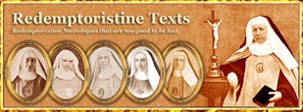
.jpg)









